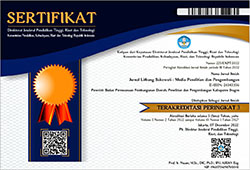PENUGASAN STUDI KASUS DALAM MENINGKATKAN KEMAMPUAN BERPIKIR KRITIS PESERTA PELATIHAN DASAR CPNS DI PEMBELAJARAN AGENDA KEDUDUKAN DAN PERAN PNS DALAM NKRI
DOI:
https://doi.org/10.32630/sukowati.v5i2.305Keywords:
basic training for civil servants, causative factors, critical thinking analysisAbstract
The purpose of this study was to examine the participants' critical thinking skills and the causal factors. This research was a mixed-methods explanatory sequential design using primary and secondary data. Primary data was taken using questionnaires, followed by the Focus Group Discussion (FGD) method to informants who were included in the side deviant cases and in-depth interviews with tutors of the Positions and Roles of Civil Servants in The Republic of Indonesia agenda. The secondary data collected were the characteristics and learning outcomes of participants. The results showed that of the 40 informants, the majority (82.5%) who had attended the Positions and Roles of Civil Servants in The Republic of Indonesia agenda at Bapelkes Semarang were still not in the category of critical thinking. Specific factors that caused this failure were misconceptions, misunderstanding roles, positions, rules, and concepts, and ineffective time management, while general factors that influence this were the lack of critical thinking skills and discussions, misunderstanding critical thinking, physical and psychological resilience, and family conditions that did not support the learning process. Researchers suggest internal and external improvements to improve learning so that the achievement of the critical thinking skills of the trainees becomes optimized
Downloads
Published
How to Cite
Issue
Section
License
Copyright (c) 2022 Wulandari Indri Hapsari, Arif Rahmat Kurnia

This work is licensed under a Creative Commons Attribution 4.0 International License.

















